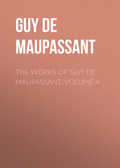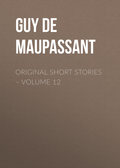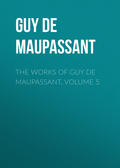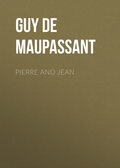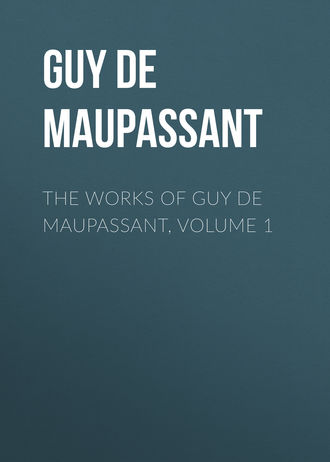
Ги де Мопассан
The Works of Guy de Maupassant, Volume 1
LOVE.THREE PAGES FROM A SPORTSMAN'S BOOK
I have just read among the General News in one of the papers, a drama of passion. He killed her and then he killed himself, so he must have loved her. What matter He or She? Their love alone matters to me; and it does not interest me because it moves me or astonishes me, or because it softens me or makes me think, but because it recalls to my mind a remembrance of my youth, a strange recollection of a hunting adventure where Love appeared to me, as the Cross appeared to the early Christians, in the midst of the heavens.
I was born with all the instincts and the senses of primitive man, tempered by the arguments and the feelings of a civilized being. I am passionately fond of shooting, and the sight of the bleeding animal, with the blood on its feathers and on my hands, affect my heart so, as almost to make it stop.
That year the cold weather set in suddenly towards the end of autumn, and I was invited by one of my cousins, Karl de Rauville, to go with him and shoot ducks on the marshes, at daybreak.
My cousin, who was a jolly fellow of forty, with red hair, very stout and bearded, a country gentleman, an amiable semi-brute, of a happy disposition and endowed with that Gallic wit which makes even mediocrity agreeable, lived in a house, half farmhouse, half château, situated in a broad valley through which a river ran. The hills right and left were covered with woods, old seignorial woods where magnificent trees still remained, and where the rarest feathered game in that part of France was to be found. Eagles were shot there occasionally, and birds of passage, those which rarely come into our over-populated part of the country, almost infallibly stopped amid these branches, which were centuries old, as if they knew or recognized a little corner of a forest of ancient times which had remained there to serve them as a shelter during their short nocturnal halting place.
In the valley there were large meadows watered by trenches and separated by hedges; then, further on the river, which up to that point had been canalized, expanded into a vast marsh. That marsh, which was the best shooting ground which I ever saw, was my cousin's chief care, who kept it like a park. Among the number of rushes that covered it, and made it living, rustling and rough, narrow passages had been made, through which the flat-bottomed boats, which were impelled and steered by poles, passed along silently over the dead water, brushed up against the reeds and made the swift fish take refuge among the weeds, and the wild fowl dive, whose pointed, black heads disappeared suddenly.
I am passionately fond of the water; the sea, although it is too vast, too full of movement, impossible to hold, the rivers, which are so beautiful, but which pass on, flee away and go, and above all the marshes, where the whole unknown existence of aquatic animals palpitates. The marsh is an entire world to itself on earth, a different world which has its own life, its settled inhabitants and its passing travelers, its voices, its noises, and above all its mystery. Nothing is more disturbing, nothing, more disquieting, more terrifying occasionally, than a fen. Why should this terror hang over these low plains covered with water? Is it the vague rustling of the rushes, the strange Will-o'-the-wisps, the profound silence which envelops them on calm nights, or is it the strange mists, which hang over the rushes like a shroud; or else it is the imperceptible splashing, so slight and so gentle, and sometimes more terrifying than the cannons of men or the thunders of skies, which make these marshes resemble countries which none has dreamed of, terrible countries concealing an unknown and dangerous secret.
No, something else belongs to it, another mystery, more profound and graver floats amid these thick mists, perhaps the mystery of the creation itself! For was it not in stagnant and muddy water, amid the heavy humidity of moist land under the heat of the sun, that the first germ of life vibrated and expanded to the day?
I arrived at my cousin's in the evening. It was freezing hard enough to split stones.
During dinner, in the large room whose sideboards, walls and ceilings were covered with stuffed birds, with extended wings or perched on branches to which they were nailed, hawks, herons, owls, nightjars, buzzards, tiercels, vultures, falcons, my cousin, who himself resembled some strange animal from a cold country, dressed in a sealskin jacket, told me what preparations he had made for that same night.
We were to start at half past three in the morning, so as to arrive at the place which he had chosen for our watching place at about half past four. On that spot a hut had been built of lumps of ice, so as to shelter us somewhat from the terrible wind which precedes daybreak, that wind which is so cold that it tears the flesh as if with a saw, cuts it like the blade of a knife and pricks it like a poisoned sting, twists it like a pair of pincers, and burns it like fire.
My cousin rubbed his hands: "I have never known such a frost," he said; "it is already twelve degrees below zero at six o'clock in the evening."
I threw myself onto my bed immediately after we had finished our meal, and I went to sleep by the light of a bright fire burning in the grate.
At three o'clock he woke me. In my turn, I put on a sheepskin, and I found my cousin Karl covered with a bearskin. After having each of us swallowed two cups of scalding coffee, followed by glasses of liqueur brandy, we started, accompanied by a gamekeeper and our dogs, Plongeon and Pierrot.
From the first moment that I got outside, I felt chilled to the very marrow. It was one of those nights on which the earth seems dead with cold. The frozen air becomes resisting and palpable, such pain does it cause; no breath of wind moves it, it is fixed and motionless; it bites, pierces through you, dries, kills the trees, the plants, the insects, the small birds themselves that fall from the branches onto the hard ground, and become hard themselves under the grip of the cold.
The moon, which was in her last quarter and was inclining all to one side, seemed fainting in the midst of space, and so weak that she did not seem able to take her departure, and so she remained up yonder, also seized and paralyzed by the severity of the weather. She shed a cold, mournful light over the world, that dying and wan light which she gives us every month, at the end of her resurrection.
Karl and I went side by side, our backs bent, our hands in our pockets and our guns under our arms. Our boots, which were wrapped in wool, so that we might be able to walk without slipping on the frozen river, made no sound, and I looked at the white vapor which our dogs' breath made.
We were soon on the edge of the marsh, and we went into one of these lanes of dry rushes which ran through this low forest.
Our elbows, which touched the long, ribbonlike leaves, left a slight noise behind us, and I was seized, as I had never been before, by the powerful singular emotion which marshes cause in me. This one was dead, dead from cold, since we were walking on it, in the middle of its population of dried rushes.
Suddenly, at the turn of one of the lanes, I perceived the ice-hut which had been constructed to shelter us. I went in, and as we had nearly an hour to wait before the wandering birds would awake, I rolled myself up in my rug in order to try and get warm.
Then, lying on my back, I began to look at the misshapen moon, which had four horns, through the vaguely transparent walls of this polar house.
But the frost of the frozen marshes, the cold of these walls, the cold from the firmament penetrated me so terribly, that I began to cough.
My cousin Karl became uneasy. "So much the worse if we do not kill much to-day," he said, "I do not want you to catch cold; we will light a fire." And he told the gamekeeper to cut some rushes.
We made a pile in the middle of our hut, which had a hole in the middle of the roof to let out the smoke, and when the red flames rose up to the clear, crystal cloisons they began to melt, gently, imperceptibly, as if these stones of ice had sweated. Karl, who had remained outside, called out to me: "Come and look here!" I went out of the hut and remained, struck with astonishment. Our hut, in the shape of a cone, looked like an enormous diamond with a heart of fire, which had been suddenly planted there in the midst of the frozen water of the marsh. And inside we saw two fantastic forms, those of our dogs, who were warming themselves at the fire.
But a peculiar cry, a lost, a wandering cry, passed over our heads, and the light from our hearth showed us the wild birds. Nothing moves one so much as the first clamor of life which one does not see, and which is passing through the somber air so quickly and so far off, before the first streak of the winter's day appears on the horizon. It seems to me at this glacial hour of dawn, as if that passing cry which is carried away by the wings of a bird, is the sigh of a soul from the world!
"Put out the fire," Karl said. "It is getting daylight."
The sky was, in fact, beginning to grow pale, and the flights of ducks made long, rapid spots, which were soon obliterated, on the sky.
A stream of light burst out into the night; Karl had fired, and the two dogs ran forward.
And then, nearly every minute, now he, now I, aimed rapidly as soon as the shadow of a flying flock appeared above the rushes. And Pierrot and Plongeon, out of breath but happy, retrieved the bleeding birds for us, whose eyes still, occasionally, looked at us.
The sun had risen, and it was a bright day with a blue sky, and we were thinking of taking our departure, when two birds with extended necks and outstretched wings, glided rapidly over our heads. I fired, and one of them fell almost at my feet. It was a teal, with a silver breast, and then, in the blue space above me, I heard a voice, the voice of a bird. It was a short, repeated, heartrending lament; and the bird, the little animal that had been spared began to turn round in the blue sky, over our heads, looking at its dead companion which I was holding in my hand.
Karl was on his knees, his gun to his shoulder watching it eagerly, until it should be within shot. "You have killed the duck," he said, "and the drake will not fly away."
He certainly did not fly away; he turned round over our heads continually, and continued his cries. Never have any groans of suffering pained me so much as that desolate appeal, as that lamentable reproach of this poor bird which was lost in space.
Occasionally he took a flight under the menace of the gun which followed his flight, and seemed ready to continue his flight alone, but as he could not make up his mind to this, he soon returned to find his mate.
"Leave her on the ground," Karl said to me, "he will come within shot by and by." And he did indeed come near us, careless of danger, infatuated by his animals' love, by his affection for that other animal which I had just killed.
Karl fired, and it was as if somebody had cut the string which held the bird suspended. I saw something black descend, and I heard the noise of a fall among the rushes. And Pierrot brought it to me.
I put them – they were already cold – into the same bag, and I returned to Paris the same evening.
THE HOLE
CUTS AND WOUNDS WHICH CAUSED DEATH. That was the heading of the charge which brought Leopold Renard, upholsterer, before the Assize Court.
Round him were the principal witnesses, Madame Flamèche, widow of the victim, and Louis Ladureau, cabinetmaker, and Jean Durdent, plumber.
Near the criminal was his wife, dressed in black, a little ugly woman, who looked like a monkey dressed as a lady.
This is how Renard (Leopold) recounted the drama:
"Good heavens, it is a misfortune of which I was the first victim all the time, and with which my will has nothing to do. The facts are their own commentary, Monsieur le Président. I am an honest man, a hard working man, an upholsterer in the same street for the last sixteen years, known, liked, respected and esteemed by all, as my neighbors have testified, even the porter who is not folâtre every day. I am fond of work, I am fond of saving, I like honest men, and respectable pleasures. That is what has ruined me, so much the worse for me; but as my will had nothing to do with it, I continue to respect myself.
"Every Sunday for the last five years, my wife and I have been to spend the day at Passy. We get fresh air, without counting that we are fond of fishing. Oh! we are as fond of it as we are of small onions. Mélie inspired me with that passion, the jade, and she is more enthusiastic than I am, the scold, seeing that all the mischief in this business is her fault, as you will see immediately.
"I am strong and mild-tempered, without a pennyworth of malice in me. But she! oh! la! la! she looks like nothing, she is short and thin; very well, she does more mischief than a weasel. I do not deny that she has some good qualities; she has some, and very important ones for a man in business. But her character! Just ask about it in the neighborhood, and even the porter's wife, who has just sent me about my business … she will tell you something about it.
"Every day she used to find fault with my mild temper: 'I would not put up with this! I would not put up with that.' If I had listened to her, Monsieur le Président, I should have had at least three bouts of fisticuffs a month…"
Madame Renard interrupted him: "And for good reasons too; they laugh best who laugh last."
He turned towards her frankly: "Oh! very well, I can charge you, since you were the cause of it."
Then, facing the President again he said:
"I will continue. We used to go to Passy every Saturday evening, so as to be able to begin fishing at daybreak the next morning. It is a habit which has become a second nature with us, as the saying is. Three years ago this summer I discovered a place, oh! such a spot! Oh! there! in the shade, eight feet of water at least and perhaps ten, a hole with retour under the bank, a regular nest for fish and a paradise for the fisherman. I might look upon that hole as my property, Monsieur le Président, as I was its Christopher Columbus. Everybody in the neighborhood knew it, without making any opposition. They used to say: 'That is Renard's place;' and nobody would have gone to it, not even Monsieur Plumsay, who is well known, be it said without any offense, for boning other peoples' places.
"Well, I returned to my place of which I felt certain, just as if I had owned it. I had scarcely got there on Saturday, when I got into Delila, with my wife. Delila is my Norwegian boat, which I had built by Fourmaise, and which is light and safe. Well, as I said, we got into the boat and we were going to bait, and for baiting, there is nobody to be compared with me, and they all know it. You want to know with what I bait? I cannot answer that question; it has nothing to do with the accident; I cannot answer, that is my secret. There are more than three hundred people who have asked me; I have been offered glasses of brandy and liquors, fried fish, matelotes,16 to make me tell! But just go and try whether the chub will come. Ah! they have patted my stomach to get at my secret, my recipe… Only my wife knows … and she will not tell it, any more than I shall!.. Is not that so Mélie?"
The President of the Court interrupted him.
"Just get to the facts as soon as you can," and the accused continued: "I am getting to them; I am getting to them." Well, on Saturday July 8, we left by the twenty-five past five train, and before dinner we went to ground-bait as usual. The weather promised to keep fine, and I said to Mélie: 'All right for to-morrow!' And she replied: 'It looks like it.' We never talk more than that together.
"And then we returned to dinner. I was happy and thirsty, and that was the cause of everything. I said to Mélie: 'Look here Mélie, it is fine weather, so suppose I drink a bottle of Casque à mèche.' That is a little white wine which we have christened so, because if you drink too much of it it prevents you from sleeping and takes the place of a nightcap. Do you understand me?
"She replied: 'You can do as you please, but you will be ill again, and I will not be able to get up to-morrow.' That was true, sensible and prudent, clear-sighted, I must confess. Nevertheless, I could not withstand it, and I drank my bottle. It all comes from that.
"Well, I could not sleep. By Jove! It kept me awake till two o'clock in the morning, and then I went to sleep so soundly that I should not have heard the angel shouting at the last Judgment.
"In short, my wife woke me at six o'clock, and I jumped out of bed, hastily put on my trousers and jersey, washed my face and jumped on board Delila. But it was too late, for when I arrived at my hole it was already taken! Such a thing had never happened to me in three years, and it made me feel as if I were being robbed under my own eyes. I said to myself, 'Confound it all! confound it!' And then my wife began to nag at me. 'Eh! What about your Casque à mèche! Get along, you drunkard! Are you satisfied, you great fool?' I could say nothing, because it was all quite true, and so I landed all the same near the spot and tried to profit by what was left. Perhaps after all the fellow might catch nothing, and go away.
"He was a little thin man, in white linen coat and waistcoat, and with a large straw hat, and his wife, a fat woman who was doing embroidery, was behind him.
"When she saw us take up our position close to their place, she murmured: 'I suppose there are no other places on the river!' And my wife, who was furious, replied: 'People who know how to behave, make inquiries about the habits of the neighborhood before occupying reserved spots.'
"As I did not want a fuss, I said to her: 'Hold your tongue, Mélie. Let them go on, let them go on; we shall see.'
"Well, we had fastened Delila under the willow trees, and had landed and were fishing side by side, Mélie and I, close to the two others; but here, Monsieur, I must enter into details.
"We had only been there about five minutes when our male neighbor's float began to go down two or three times, and then he pulled out a chub as thick as my thigh, rather less, perhaps, but nearly as big! My heart beat, and the perspiration stood on my forehead, and Mélie said to me: 'Well, you sot, did you see that?'
"Just then, Monsieur Bru, the grocer of Poissy, who is fond of gudgeon fishing, passed in a boat, and called out to me; 'So somebody has taken your usual place, Monsieur Renard?' And I replied: 'Yes, Monsieur Bru, there are some people in this world who do not know the usages of common politeness.'
"The little man in linen pretended not to hear, nor his fat lump of a wife, either."
Here the President interrupted him a second time: "Take care, you are insulting the widow, Madame Flamèche, who is present."
Renard made his excuses: "I beg your pardon, I beg pardon, my anger carried me away." Well, not a quarter of an hour had passed when the little man caught another chub and another almost immediately, and another five minutes later.
"The tears were in my eyes, and then I knew that Madame Renard was boiling with rage, for she kept on nagging at me: 'Oh! how horrid! Don't you see that he is robbing you of your fish? Do you think that you will catch anything? Not even a frog, nothing whatever. Why my hands are burning, just to think of it.'
"But I said to myself: 'Let us wait until twelve o'clock. Then this poaching fellow will go to lunch, and I shall get my place again.' As for me, Monsieur le Président, I lunch on the spot every Sunday; we bring our provisions in Delila. But there! At twelve o'clock, the wretch produced a fowl out of a newspaper, and while he was eating, actually he caught another chub!
"Mélie and I had a morsel also, just a thumb-piece, a mere nothing, for our heart was not in it.
"Then I took up my newspaper, to aid my digestion. Every Sunday I read the Gil Blas in the shade like that, by the side of the water. It is Columbine's day, you know, Columbine who writes the articles in the Gil Blas. I generally put Madame Renard into a passion by pretending to know this Columbine. It is not true, for I do not know her, and have never seen her, but that does not matter; she writes very well, and then she says things straight out for a woman. She suits me, and there are not many of her sort.
"Well, I began to tease my wife, but she got angry immediately, and very angry, and so I held my tongue, and at that moment our two witnesses who are present here, Monsieur Ladureau and Monsieur Durdent appeared on the other side of the river. We knew each other by sight. The little man began to fish again, and he caught so many that I trembled with vexation, and his wife said: 'It is an uncommonly good spot, and we will come here always Desiré.' As for me, a cold shiver ran down my back, and Madame Renard kept repeating: 'You are not a man; you have the blood of a chicken in your veins;' and suddenly I said to her: 'Look here, I would rather go away, or I shall only be doing something foolish.'
"And she whispered to me as if she had put a red-hot iron under my nose: 'You are not a man. Now you are going to run away, and surrender your place! Off you go, Bazaine!'
"Well, I felt that, but yet I did not move, while the other fellow pulled out a bream, oh! I never saw such a large one before, never! And then my wife began to talk aloud, as if she were thinking, and you can see her trickery. She said: 'That is what one might call stolen fish, seeing that we baited the place ourselves. At any rate, they ought to give us back the money we have spent on bait.'
"Then the fat woman in the cotton dress said in turn: 'Do you mean to call us thieves, Madame?' And they began to explain, and then they came to words. Oh! Lord! those creatures know some good ones. They shouted so loud, that our two witnesses, who were on the other bank, began to call out by way of a joke: 'Less noise over there; you will prevent your husbands from fishing.'
"The fact is that neither of us moved any more than if we had been two tree-stumps. We remained there, with our noses over the water, as if we had heard nothing, but by Jove, we heard all the same. 'You are a mere liar. – You are nothing better than a streetwalker. – You are only a trollop. – You are a regular strumpet.' And so on, and so on; a sailor could not have said more.
"Suddenly I heard a noise behind me, and turned round. It was the other one, the fat woman, who had fallen onto my wife with her parasol. Whack! whack! Mélie got two of them, but she was furious, and she hits hard when she is in a rage, so she caught the fat woman by the hair and then, thump, thump, and slaps in the face rained down like ripe plums. I should have let them go on; women among themselves; men among themselves; it does not do to mix the blows, but the little man in the linen jacket jumped up like a devil and was going to rush at my wife. Ah! no, no, not that my friend! I caught the gentleman with the end of my fist, and crash, crash, one on the nose, the other in the stomach. He threw up his arms and legs and fell on his back into the river, just into the hole.
"I should have fished him out most certainly, Monsieur le Président, if I had had the time. But unfortunately the fat woman got the better of it, and she was drubbing Mélie terribly. I know that I ought not to have assisted her while the man was drinking his fill, but I never thought that he would drown, and said to myself: 'Bah, it will cool him.'
"I therefore ran up to the women to separate them, and all I received was scratches and bites. Good Lord, what creatures! Well, it took me five minutes, and perhaps ten to separate those two viragoes, and when I turned round, there was nothing more to be seen, and the water was as smooth as a lake, while the others yonder kept shouting: 'Fish him out!' and though it was all very well to say that, I cannot swim and still less dive!
"At last the man from the dam came, and two gentlemen with boat hooks, but it had taken over a quarter of an hour. He was found at the bottom of the hole in eight feet of water, as I have said, but he had got it, the poor little man in his linen suit! There are the facts, such as I have sworn to. I am innocent, on my honor."
The witnesses having deposed to the same effect, the accused was acquitted.



